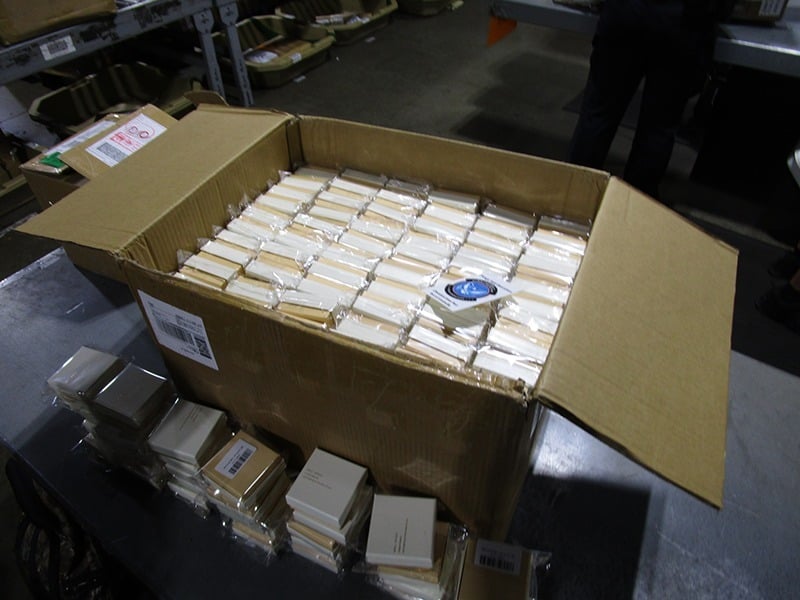Nearly 2,200 pieces of counterfeit jewelry were found in five shipments that were intercepted by U.S. Customs and Border Protection officials in Louisville on June 19 and 20.
The first shipment from China arrived on June 19 and was going to a house in Pennsylvania. 318 bracelets were seized by officers for displaying counterfeit Cartier logos. Another cargo, coming from Hong Kong and bound for a Tampa home, was intercepted by CBP later that evening. More fake jewelry, notably 490 necklaces, 205 pairs of earrings, and 80 rings displaying unapproved trademarks belonging to Van Cleef and Arpels, was included in this second consignment.
Officers intercepted three shipments of 800 fake Cartier bracelets on the evening of June 20. Two of these shipments were going to a home in Fayetteville, North Carolina, while the third container was going to Michigan. All of these shipments originated in China.
The agency’s trade experts, the CBP Centers of Excellence and Expertise, determined that the 2,193 goods had counterfeit marks. The total Manufacturer’s Suggested Retail Price of the five shipments, if these items were authentic, would have exceeded $25.32 million.
According to LaFonda D. Sutton-Burke, Director of Field Operations, Chicago Field Office, intellectual property theft fuels criminal activity and organized crime and jeopardizes America’s economic health. Legitimate businesses may be forced to reduce staff as a result of consumers buying counterfeit items. Our officers are committed to safeguarding consumers and private enterprise by eliminating these types of shipments from our trade.
Over the past three years, jewelry, watches, and handbags/wallets have been the top three goods seized for intellectual property rights (IPR) infringement, with the largest total MSRP. Furthermore, the top two source countries for IPR seizures are continuously China and Hong Kong. Approximately 90% of the entire amount seized in Fiscal Year 2024 came from China and Hong Kong.
These products are frequently offered for sale on third-party e-commerce websites and in underground stores. Smugglers and organized criminal members are financed by counterfeit goods. Customers frequently think they are purchasing an authentic product, but they quickly discover it is not up to par.
Theft of intellectual property is not a crime without victims. American consumers, companies, trademark owners, and those who produce and market genuine goods are the victims. The illegal money made from the selling of fake or unregistered goods is frequently used to fund a variety of criminal activities. Criminals sell counterfeit American goods and pirated goods all over the world. Additionally, by incorporating dangerous and prohibited materials into counterfeit goods and encouraging unethical labor practices, these trade practices endanger the public’s health and safety, the American economy, and national security, even though purchasing a knockoff purse, an inexpensive electronic device, or a less expensive prescription drug may seem harmless.
Through a vigorous program of intellectual property rights enforcement, CBP Trade defends American companies’ rights, preserving American invention and inventiveness while protecting them from unfair competition and nefarious usage. You can report suspected infractions to CBP at ateallegations.cbp.gov.
IPR violations can also be reported to the National Intellectual Property Rights Coordination Center at www.iprcenter.gov or by phone at 1-866-IPR-2060. If you have any information about suspected fraud or illegal trade activity, please contact CBP via the e-Allegations Online Trade Violations Reporting System or by calling 1-800-BE-ALERT.
CBP officers from the Office of Field Operations oversee the CBP border security mission at 328 ports of entry. To find out more about how CBP’s Office of Field Operations protects our country’s borders, visit CBP Ports of Entry. CBP can be found at www.CBP.gov.
American Customs and Border Security






